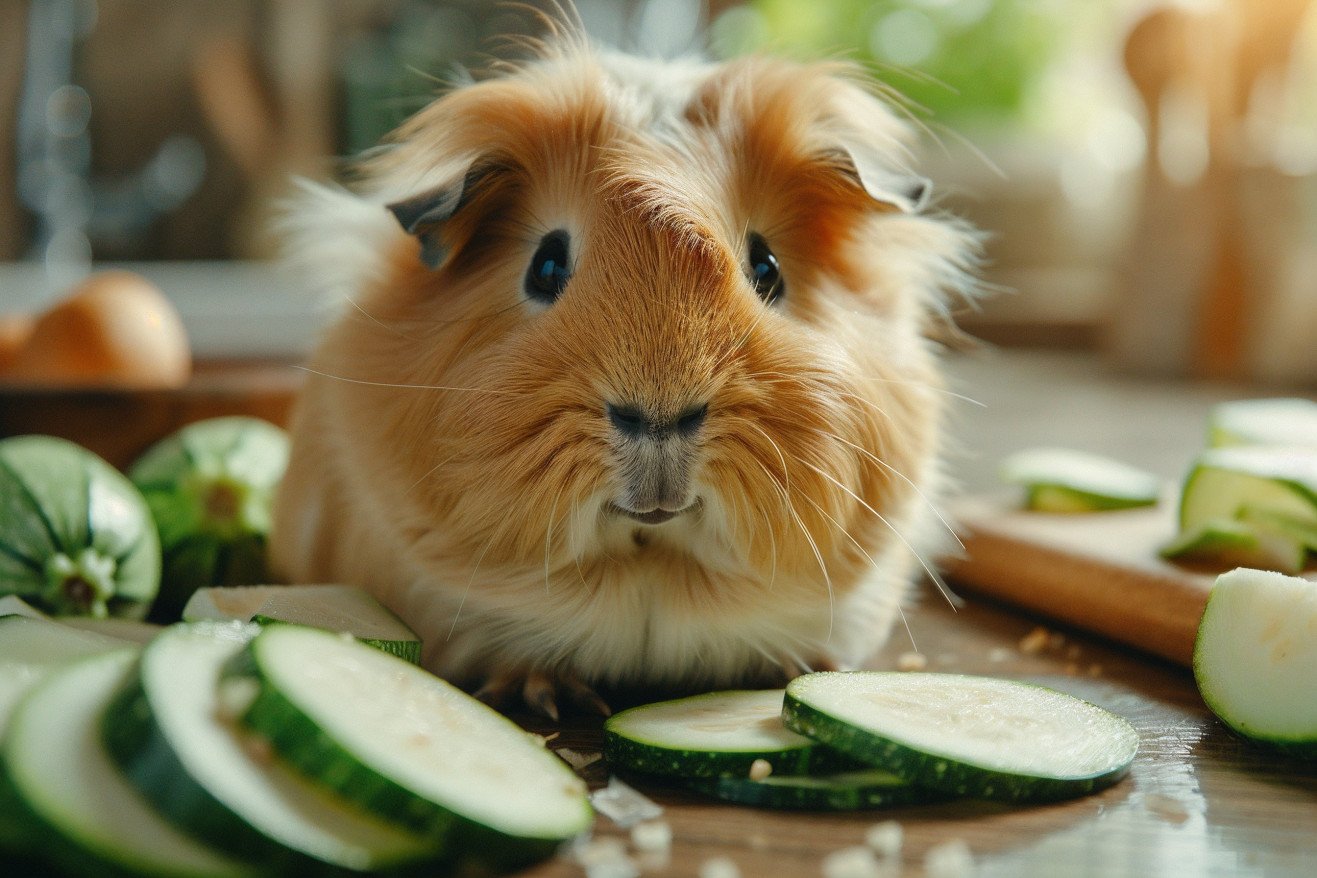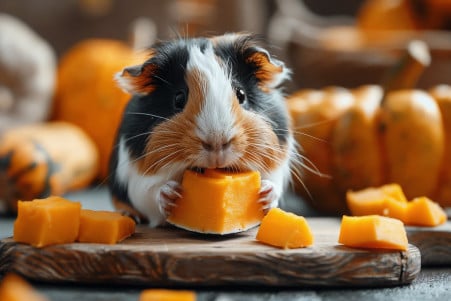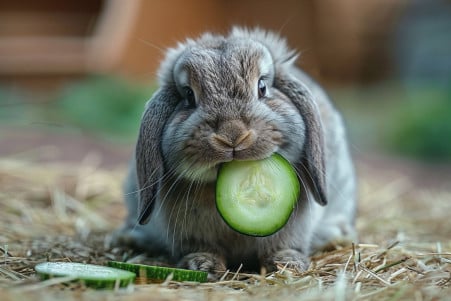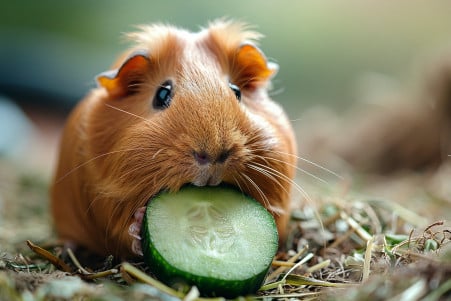Can Guinea Pigs Eat Zucchini? A Nutritional Guide for Owners
14 February 2024 • Updated 15 February 2024

If you’re a fan of zucchini, you may be wondering if your guinea pig can enjoy this popular vegetable too. The good news is that guinea pigs can eat zucchini. Zucchini is a healthy vegetable that is rich in vitamin C and fiber while being low in sugar and salt. It should be served raw and fresh, and you should start with small portions to make sure your pet can tolerate it.
To make sure this article is as accurate and up-to-date as possible, we’ve referenced multiple veterinary nutritionists and other animal experts to bring you the most comprehensive information. We’ve also made sure to cross-reference our information with reputable sources, and we’ve taken a close look at the guinea pig’s unique digestive system.
This way, we can make sure we’re covering whether zucchini is safe for guinea pigs to eat, and if so, how it can be best incorporated into their diet to make sure they get everything they need.
Can guinea pigs eat zucchini?
Nutritional Benefits of Zucchini for Your Guinea Pig
A quick glance at the nutritional profile of zucchini makes it easy to see why it’s a great option for guinea pig diets. According to Healthline, zucchini is a nutrient-dense, low-calorie fruit that’s loaded with important vitamins. These include vitamin A, manganese, vitamin C, potassium, and magnesium.
Since guinea pigs can’t make their own vitamin C, they need to get it from their diet, and zucchini is a great way to help them avoid scurvy, a problem noted by the PDSA.
The fruit’s fiber content helps ensure that guinea pigs have healthy digestion, which is important for avoiding gut stasis, something that the PDSA warns about. It also helps keep their teeth healthy by grinding them down as they chew. Plus, its low sugar and salt content helps prevent weight gain and other health problems.
Zucchini’s high water content and good mix of vitamins make it a better choice than many other vegetables, especially when it comes to keeping your guinea pig hydrated on a hot day. However, it’s important not to overdo it. The Humane Society of the United States suggests that guinea pigs only get 1/2 to one cup of fresh vegetables per day, per pig, and they stress the importance of variety.
It’s important to make sure your guinea pig has a varied and balanced diet to ensure that they get all the nutrients they need. By combining hay, vitamin C–fortified pellets, and fresh vegetables like zucchini, you can make sure that your guinea pig gets the nutrition they need.
How to Make Sure Your Guinea Pig Has a Healthy Diet
In order to make sure your guinea pig lives a long and healthy life, it’s important to make sure their diet is well-rounded and includes plenty of hay and fresh vegetables.
The RSPCA explains that hay, which is similar to the grasses that guinea pigs eat in the wild, should be the main part of their diet and is important for both their digestive health and to help keep their teeth from getting too long. This should be supplemented with a variety of fresh vegetables every day, including zucchini, which will help them get the fiber and micronutrients they need.
Vitamin C is an important part of a guinea pig’s diet because they can’t produce it on their own. A lack of vitamin C can lead to health problems like scurvy. Fresh greens and guinea pig pellets that have been specially formulated to include vitamin C can help make sure your guinea pig gets enough vitamin C every day.
Just like people, guinea pigs benefit from eating a variety of foods. However, it’s important to make sure that their diet is still balanced and that they don’t eat too much of any one thing. Introduce new foods like zucchini slowly to avoid upsetting their digestive system. There are also some foods that guinea pigs should never eat, including lawn clippings.
It’s important to remember that guinea pigs have a unique digestive system that’s adapted to eating high-fiber foods like hay and zucchini, so it’s important to make sure their diet is balanced and includes a variety of foods.
How Guinea Pigs Digest Zucchini
Guinea pigs have a highly specialized digestive system that has evolved to extract nutrients from fibrous plant material. With teeth that grow continuously, guinea pigs are designed to chew constantly, an important behavior for maintaining dental health and proper digestion.
Their digestive system, including the process of hindgut fermentation, is what allows them to digest fibrous foods like zucchini. The large intestine and caecum of guinea pigs are home to bacteria that ferment fiber, which makes the nutrients in the fiber available to the animal. When guinea pigs eat their caecotrophs, they are reingesting these nutrients.
By adding zucchini to a guinea pig’s diet, you can help support this system, as the fiber in zucchini is important for maintaining good digestion. However, as PMC explains, even small changes in diet can lead to major digestive upset. To avoid issues like diarrhea or GI stasis, make sure to introduce zucchini slowly and watch for signs of digestive upset like loose stools or a loss of appetite.
Feeding zucchini to guinea pigs responsibly will help ensure that they get the nutritional benefits of the vegetable without any negative effects on their digestion. It’s important to always pay attention to how your pet responds to new foods to make sure they stay healthy, and this is something that should always be done with caution and care.
How to Manage the Risks: Feeding Your Guinea Pig Zucchini
Despite the benefits of zucchini for guinea pigs, there are some risks to consider. A study on pet exposure to pesticides in New York, as reported by ScienceDirect, found that pesticide residues on vegetables, including zucchini, are a concern for guinea pigs.
To reduce this risk, make sure to wash zucchini very well before giving it to your pet. In addition, Beyond Pesticides recommends organic fruits and vegetables as a safer choice, noting that small animals like guinea pigs are especially susceptible to toxic chemicals.
In addition, some guinea pigs may not like the skin of the zucchini.
While Dr. Jess from Vet Explains Pets explains that the skin is not toxic, it can be removed for guinea pigs that are picky eaters or have sensitive stomachs.
After you start feeding your guinea pig zucchini, watch them for any signs of negative reactions, including diarrhea, lethargy, or a loss of appetite. If you notice any negative reactions, cut back on or eliminate the zucchini from their diet and try other vegetables like cucumbers and bell peppers, which are also low in sugar and high in vitamins and minerals.
It’s important to make sure that fresh fruits and vegetables like zucchini are safe for your guinea pig to eat so that you can help them stay healthy. Being responsible about where you get your guinea pig’s fruits and vegetables and how you prepare them can make a big difference in your pet’s well-being.
How Zucchini Is Grown and the Safety of Your Guinea Pig
When it comes to your guinea pig’s health, knowing where their food comes from is just as important as knowing what it is. Zucchini is often grown by farmers using a variety of agricultural methods, including the use of pesticides.
A study published on PMC found that dogs and cats have been found to be exposed to pesticides, which can also impact smaller animals like guinea pigs. To ensure that zucchini is safe for your guinea pig, it’s best to buy organic, as it’s less likely to have been treated with harmful chemicals.
Even if you buy organic zucchini, it’s still important to wash it thoroughly. A study on greenhouse-grown zucchini found that disease management is important for ensuring the safety of the crop, which underscores the importance of washing. Washing zucchini helps to remove any pesticides that may be left on the skin and also helps to remove any pathogens, ensuring that the zucchini you give your pet is as safe as possible.
By buying zucchini responsibly and preparing it carefully, you can make sure that you’re not only protecting your guinea pig from potential toxins but also supporting their health and well-being. This is an important part of being a responsible guinea pig owner.
Final Thoughts: Zucchini Is a Healthy Option for Guinea Pigs
In conclusion, zucchini is a healthy and nutritious treat for guinea pigs that can be fed in moderation. The vitamin C and fiber in zucchini can help guinea pigs maintain their immune and digestive systems. Properly preparing zucchini by washing and occasionally peeling it will help ensure that it is free from pesticides and safe for guinea pigs to eat.
A well-rounded diet is important for guinea pigs, and it should include a base of hay, a selection of fresh vegetables, and a small amount of high-quality pellets. Zucchini can help provide the variety that is necessary for a guinea pig’s diet.
For the most personalized and comprehensive care, make sure to talk to a vet. With that said, guinea pig owners can feel good about feeding their pets zucchini as a nutritious and delicious treat that will help them meet their dietary needs.


